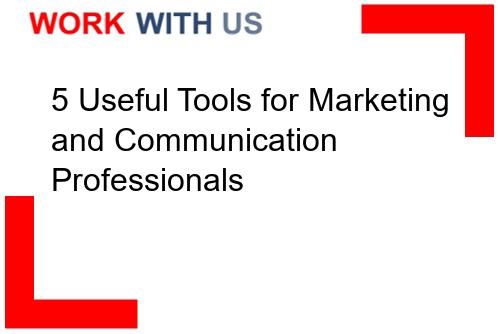In the fast-paced world of marketing and communication, professionals are constantly seeking innovative tools to enhance their strategies and streamline their workflows. With the ever-evolving digital landscape, staying ahead of the curve is crucial to success. Fortunately, there are several useful tools available that can empower marketing and communication professionals to achieve their goals more efficiently and effectively. From social media management to content creation, these five tools are indispensable for professionals in this field.
First and foremost, social media management platforms have become essential for marketing and communication professionals. These tools, such as Hootsuite and Buffer, allow users to schedule and publish posts across multiple social media platforms simultaneously. With the ability to plan and automate content distribution, professionals can save valuable time and maintain a consistent online presence. Additionally, these platforms provide in-depth analytics and reporting features, enabling professionals to track the performance of their social media campaigns and make data-driven decisions.
Another invaluable tool for marketing and communication professionals is a customer relationship management (CRM) system. CRM software, like Salesforce or HubSpot, helps professionals organize and manage their interactions with clients and prospects. These systems provide a centralized database for storing customer information, tracking communication history, and managing sales pipelines. By leveraging CRM tools, professionals can streamline their workflows, improve customer relationships, and ultimately drive business growth.
Content creation is a fundamental aspect of marketing and communication, and professionals need tools that facilitate the process. Canva, for instance, is a user-friendly graphic design platform that allows professionals to create visually appealing and engaging content without the need for extensive design skills. With a wide range of templates, fonts, and images, Canva empowers professionals to produce high-quality graphics for social media posts, blog articles, and presentations.
In addition to content creation, effective project management is crucial for marketing and communication professionals. Tools like Trello and Asana provide a visual and collaborative platform for managing tasks, deadlines, and team communication. These project management tools enable professionals to stay organized, delegate responsibilities, and track progress, ensuring that projects are completed efficiently and on time.
Lastly, email marketing tools are essential for professionals looking to engage with their audience effectively. Platforms like Mailchimp and Constant Contact offer features such as email automation, customizable templates, and detailed analytics. These tools enable professionals to create targeted email campaigns, track open rates and click-through rates, and segment their audience for more personalized communication.
In conclusion, marketing and communication professionals have a wide array of tools at their disposal to enhance their strategies and streamline their workflows. From social media management platforms to CRM systems, content creation tools, project management software, and email marketing platforms, these five tools are indispensable for professionals in this field. By leveraging these tools effectively, professionals can optimize their efforts, improve productivity, and achieve their marketing and communication goals with greater efficiency and success.
The power of social media: 5 essential tools for marketing and communication professionals
The power of social media has revolutionized the way marketing and communication professionals operate in today’s digital age. With the ever-increasing popularity of platforms such as Facebook, Twitter, Instagram, LinkedIn, and YouTube, these professionals have a plethora of tools at their disposal to effectively reach and engage with their target audience. In this article, we will explore five essential tools that every marketing and communication professional should utilize to maximize their social media presence and achieve their goals.
First and foremost, analytics tools are indispensable for any marketing and communication professional. These tools provide valuable insights into the performance of social media campaigns, allowing professionals to track key metrics such as reach, engagement, and conversion rates. By analyzing this data, professionals can identify trends, understand their audience better, and make data-driven decisions to optimize their strategies. Google Analytics, for instance, offers a comprehensive suite of tools that enable professionals to monitor website traffic, track conversions, and gain a deeper understanding of user behavior.
Another essential tool for marketing and communication professionals is social media management software. These platforms, such as Hootsuite and Sprout Social, allow professionals to streamline their social media activities by scheduling posts, managing multiple accounts, and monitoring conversations across various platforms from a single dashboard. This not only saves time and effort but also ensures consistent messaging and branding across different channels. Additionally, these tools often provide advanced features like social listening, sentiment analysis, and competitor analysis, enabling professionals to stay ahead of the curve and make informed decisions.
Influencer marketing has emerged as a powerful tool for professionals to amplify their brand’s reach and credibility. Collaborating with influencers who have a significant following and influence in a particular niche can help professionals tap into new audiences and build trust with their target market. Platforms like Upfluence and Traackr provide professionals with the necessary tools to identify, connect, and manage relationships with relevant influencers. By leveraging the power of influencers, marketing and communication professionals can effectively promote their products or services and generate authentic engagement with their audience.
Content creation and curation tools are also essential for professionals to maintain a consistent and engaging social media presence. Canva, for example, offers a user-friendly interface and a wide range of templates, allowing professionals to create visually appealing graphics for their social media posts. Additionally, tools like BuzzSumo and Feedly help professionals discover and curate relevant and trending content from various sources, ensuring that their social media feeds are always fresh and informative. By consistently delivering high-quality content, professionals can establish themselves as thought leaders in their industry and foster meaningful connections with their audience.
Last but not least, social media advertising platforms are indispensable for professionals looking to expand their reach and drive targeted traffic to their websites or landing pages. Platforms like Facebook Ads, Twitter Ads, and LinkedIn Ads offer sophisticated targeting options, allowing professionals to reach specific demographics, interests, and behaviors. These platforms also provide robust analytics and reporting features, enabling professionals to measure the effectiveness of their campaigns and optimize their ad spend. By leveraging social media advertising, professionals can significantly enhance their brand’s visibility, generate leads, and ultimately drive conversions.
In conclusion, the power of social media cannot be underestimated in today’s marketing and communication landscape. By utilizing essential tools such as analytics, social media management software, influencer marketing platforms, content creation and curation tools, and social media advertising platforms, professionals can effectively harness the potential of social media to achieve their marketing goals. With the right tools and strategies in place, marketing and communication professionals can stay ahead of the competition, engage with their audience, and drive meaningful results in the ever-evolving world of social media.
Unlocking the potential of email marketing: 5 tools every professional should know
Email marketing is a powerful tool that every professional should utilize to unlock their business’s potential. With the right tools and strategies, email marketing can help businesses reach their target audience, build brand awareness, and drive conversions. In this comprehensive text, we will explore five essential tools that every professional should know to maximize the effectiveness of their email marketing campaigns.
1. Email Service Providers (ESPs)
One of the most crucial tools for email marketing success is an Email Service Provider (ESP). ESPs offer a range of features and functionalities to help professionals manage their email campaigns effectively. These platforms allow users to create and send personalized emails, segment their subscriber lists, and track the performance of their campaigns. Some popular ESPs include Mailchimp, Constant Contact, and Sendinblue. These platforms also provide templates and drag-and-drop editors, making it easy for professionals to design visually appealing emails without any coding knowledge.
2. Marketing Automation Tools
Marketing automation tools are essential for streamlining and optimizing email marketing efforts. These tools enable professionals to automate various tasks, such as sending welcome emails, abandoned cart reminders, and personalized follow-ups. By setting up automated workflows, professionals can save time and deliver targeted messages to their subscribers at the right time. Popular marketing automation tools include HubSpot, ActiveCampaign, and Marketo.
3. Email Analytics and Tracking Tools
To measure the success of email marketing campaigns, professionals need access to robust analytics and tracking tools. These tools provide valuable insights into email open rates, click-through rates, conversion rates, and other key metrics. By analyzing this data, professionals can identify what works and what doesn’t, allowing them to optimize their campaigns for better results. Popular email analytics and tracking tools include Google Analytics, Mailchimp’s built-in analytics, and Litmus.
4. Personalization Tools
Personalization is a crucial aspect of effective email marketing. By tailoring emails to individual subscribers based on their preferences, demographics, and behavior, professionals can significantly increase engagement and conversions. Personalization tools allow professionals to dynamically insert personalized content, such as the recipient’s name, location, or purchase history, into their emails. This level of customization creates a more personalized and relevant experience for subscribers, leading to higher open and click-through rates. Some popular personalization tools include Dynamic Yield, Evergage, and Optimizely.
5. A/B Testing Tools
A/B testing is a powerful technique that allows professionals to compare two versions of an email to determine which one performs better. By testing different elements, such as subject lines, call-to-action buttons, or email layouts, professionals can optimize their campaigns for maximum impact. A/B testing tools provide statistical analysis and insights to help professionals make data-driven decisions. Some popular A/B testing tools for email marketing include Optimizely, VWO, and Mailchimp’s built-in A/B testing feature.
The Importance of Email List Segmentation
In addition to utilizing the right tools, professionals should also understand the importance of email list segmentation. Segmenting an email list involves dividing subscribers into smaller groups based on specific criteria, such as demographics, purchase history, or engagement level. By sending targeted emails to different segments, professionals can deliver more relevant content and increase the chances of conversion. For example, a clothing retailer can send a promotional email featuring winter coats to subscribers living in colder regions, while sending a different offer to subscribers in warmer climates.
The Power of Personalization in Email Marketing
Personalization is a key factor in the success of email marketing campaigns. By tailoring emails to individual subscribers, professionals can create a more personalized and engaging experience. Personalization goes beyond simply addressing the recipient by name; it involves using data to deliver relevant content and offers. For example, an online bookstore can send personalized recommendations based on a subscriber’s past purchases or browsing history. By leveraging personalization tools and data, professionals can build stronger relationships with their subscribers and drive higher conversions.
The Role of Email Marketing in Customer Retention
While email marketing is often associated with acquiring new customers, it also plays a crucial role in customer retention. By nurturing existing customers through targeted emails, professionals can encourage repeat purchases and foster loyalty. Email campaigns can include exclusive offers, personalized recommendations, or updates on new products or services. By staying top-of-mind with their customers, professionals can build long-term relationships and increase customer lifetime value.
The Future of Email Marketing: Artificial Intelligence and Automation
As technology continues to advance, the future of email marketing lies in the integration of artificial intelligence (AI) and automation. AI-powered tools can analyze vast amounts of data to deliver highly personalized and relevant content to subscribers. Automation will become even more sophisticated, allowing professionals to create complex workflows and trigger emails based on specific actions or events. These advancements will further enhance the effectiveness of email marketing campaigns and help professionals unlock even greater potential.
In conclusion, email marketing is a powerful tool that every professional should leverage to unlock their business’s potential. By utilizing the right tools, such as ESPs, marketing automation tools, email analytics and tracking tools, personalization tools, and A/B testing tools, professionals can create highly targeted and effective email campaigns. Additionally, understanding the importance of email list segmentation, the power of personalization, and the role of email marketing in customer retention can further enhance the effectiveness of email marketing efforts. As technology continues to evolve, the integration of AI and automation will shape the future of email marketing, enabling professionals to unlock even greater potential and drive business success.
Data-driven success: 5 analytics tools for marketing and communication professionals
In today’s digital age, marketing and communication professionals are increasingly relying on data-driven insights to make informed decisions and drive success. With the vast amount of data available, it is crucial to have the right analytics tools at your disposal. Here, we present five powerful analytics tools that can empower marketing and communication professionals to unlock valuable insights and achieve their goals.
Google Analytics: A staple in the industry, Google Analytics provides a comprehensive view of website performance and user behavior. This tool enables professionals to track key metrics such as website traffic, conversion rates, and user engagement. With its intuitive interface and customizable reports, Google Analytics allows marketers to identify trends, optimize campaigns, and measure the effectiveness of their strategies. By leveraging this tool, professionals can make data-driven decisions to enhance user experience and maximize conversions.
Socialbakers: As social media continues to play a pivotal role in marketing and communication strategies, Socialbakers offers a robust analytics platform specifically designed for social media professionals. This tool provides in-depth insights into social media performance, audience demographics, and competitor analysis. With Socialbakers, professionals can track engagement metrics, monitor brand sentiment, and identify influential content creators. Armed with these insights, marketers can refine their social media strategies, create targeted campaigns, and build stronger connections with their audience.
SEMrush: Search engine optimization (SEO) is a critical aspect of any marketing strategy, and SEMrush is a powerful tool that helps professionals optimize their online presence. With its comprehensive keyword research capabilities, backlink analysis, and competitor insights, SEMrush enables marketers to identify opportunities to improve their website’s visibility in search engine results. By leveraging this tool, professionals can uncover valuable data to enhance their content strategy, drive organic traffic, and stay ahead of the competition.
Mailchimp: Email marketing remains a highly effective communication channel, and Mailchimp is a popular tool that provides analytics to optimize email campaigns. With its user-friendly interface, professionals can track open rates, click-through rates, and subscriber behavior. Mailchimp also offers A/B testing capabilities, allowing marketers to experiment with different email variations and determine the most effective approach. By leveraging the insights provided by Mailchimp, professionals can refine their email marketing strategies, personalize content, and drive higher engagement and conversions.
Brandwatch: In an era where reputation management is crucial, Brandwatch offers a comprehensive social listening and analytics platform. This tool enables professionals to monitor brand mentions, sentiment analysis, and industry trends across various social media platforms and online channels. By understanding customer sentiment and identifying emerging trends, marketers can proactively manage their brand’s reputation, address customer concerns, and capitalize on opportunities. Brandwatch empowers professionals to make data-driven decisions that align with their brand’s values and resonate with their target audience.
In conclusion, data-driven success is essential for marketing and communication professionals in today’s digital landscape. By leveraging powerful analytics tools such as Google Analytics, Socialbakers, SEMrush, Mailchimp, and Brandwatch, professionals can unlock valuable insights, optimize their strategies, and achieve their goals. These tools provide a wealth of data and actionable insights that enable professionals to make informed decisions, enhance user experience, and drive success in their marketing and communication efforts. With the right analytics tools at their disposal, professionals can stay ahead of the competition, build stronger connections with their audience, and achieve data-driven success.
Streamlining collaboration: 5 project management tools for marketing and communication professionals
In today’s fast-paced business environment, effective collaboration is crucial for marketing and communication professionals to successfully execute projects. With multiple team members, tight deadlines, and complex tasks, it can be challenging to keep everyone on the same page. Fortunately, there are several project management tools available that can streamline collaboration and enhance productivity. Here are five top-notch tools that marketing and communication professionals can leverage to optimize their workflow.
Asana: Asana is a popular project management tool that offers a comprehensive set of features tailored for marketing and communication teams. It allows users to create tasks, assign them to team members, set deadlines, and track progress. With its intuitive interface and customizable dashboards, Asana enables seamless communication and collaboration among team members. Additionally, it offers integration with other tools such as Google Drive and Slack, making it easier to centralize project-related information and streamline workflows.
Trello: Trello is a visually appealing and user-friendly project management tool that is widely used by marketing and communication professionals. It utilizes a card-based system, where tasks are represented as cards that can be moved across different stages of completion. This visual approach provides a clear overview of the project’s progress and allows team members to collaborate effectively. Trello also offers features like checklists, due dates, and file attachments, making it a versatile tool for managing marketing campaigns and communication projects.
Monday.com: Monday.com is a highly customizable project management tool that caters to the unique needs of marketing and communication professionals. It provides a visual and interactive platform where teams can plan, track, and collaborate on projects. With its extensive range of templates and automation features, Monday.com simplifies complex workflows and enhances team productivity. It also offers integrations with popular tools like Slack, Google Drive, and Dropbox, enabling seamless communication and file sharing.
Basecamp: Basecamp is a project management tool that focuses on simplicity and ease of use. It offers a centralized platform where marketing and communication teams can collaborate, share files, and track project progress. Basecamp’s intuitive interface and straightforward features make it an ideal choice for teams who prefer a minimalist approach to project management. It also includes features like message boards, to-do lists, and document sharing, ensuring efficient communication and collaboration.
Slack: While primarily known as a communication tool, Slack also offers powerful project management capabilities. It allows marketing and communication professionals to create channels for different projects, departments, or teams, facilitating focused discussions and collaboration. Slack’s integration with various tools like Google Drive, Trello, and Asana enables seamless file sharing and task management. With its real-time messaging and notification features, Slack ensures that team members stay connected and informed throughout the project lifecycle.
The Importance of Streamlining Collaboration
Effective collaboration is essential for marketing and communication professionals to achieve their goals efficiently. By streamlining collaboration, teams can minimize miscommunication, reduce duplication of efforts, and enhance overall productivity. Project management tools play a crucial role in achieving this streamlined collaboration by providing a centralized platform for communication, task management, and progress tracking.
Benefits of Using Project Management Tools
Utilizing project management tools offers numerous benefits for marketing and communication professionals. These tools provide a structured framework for organizing tasks, setting deadlines, and assigning responsibilities. They also enable real-time collaboration, allowing team members to work together seamlessly, regardless of their physical location. Additionally, project management tools offer transparency and visibility into project progress, ensuring that everyone is on the same page and aware of their respective roles and responsibilities.
Choosing the Right Project Management Tool
When selecting a project management tool, marketing and communication professionals should consider their specific needs and requirements. Factors such as team size, project complexity, and integration capabilities should be taken into account. It is also essential to evaluate the user interface and ease of use, as a tool that is intuitive and user-friendly will enhance adoption and productivity. Additionally, considering the scalability and pricing structure of the tool is crucial to ensure it aligns with the organization’s long-term goals and budget.
Streamlining collaboration is vital for marketing and communication professionals to effectively execute projects and achieve desired outcomes. By leveraging project management tools like Asana, Trello, Monday.com, Basecamp, and Slack, teams can enhance communication, improve task management, and boost overall productivity. These tools provide a centralized platform for collaboration, enabling seamless communication, task tracking, and progress monitoring. By choosing the right project management tool and implementing it effectively, marketing and communication professionals can optimize their workflow and achieve success in their projects.



